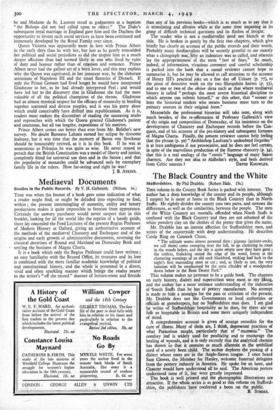Mediaeval Documents
Studies in the Public Records. By V. H. Galbraith. (Nelson. 6s.)
TIME was when the format of a book gave some indication of what a reader might find, or might be deluded into expecting to find, within ; the present intermingling of austerity, utility and luxury productions makes it quite impossible to forecast from appearance. Certainly the unwary purchaser would never suspect that in this booklet, looking for all the world like the reprint of a handy guide, there lay concealed the Ford Lectures of the present Regius Professor of Modern History at Oxford, giving an authoritative account of the methods of the mediaeval Chancery and Exchequer and of the origins and early growth of administrative documents, reversing the classical doctrines of Round and Maitland on Domesday Book and settling the business of Magna Charta.
It is a book which only the Regius Professor could have written ; an easy familiarity with the Record Office, its treasures and its lore is combined with the more familiar academic knowledge of political and constitutional history, and the whole is presented in a direct, vivid and often sparkling manner which brings the reader nearer to the writer's "off the record" Manner of lecture-room and fireside than any of his previous books—which is as much as to say that it is stimulating and allusive while at the same time imposing in its grasp of difficult technical questions and its flashes of insight.
The reader who is not a mediaevalist need not blench at the title. He is broken in gently by the first two chapters, which give briefly but clearly an account of the public records and their worth. Probably many mediaevalists will be secretly grateful to see exactly what a chirograph was, Why an indenture was so called, and wherein lay the appropriateness of the term " feet of fines." So much, indeed, of information, vivacious comment and careful scholarship is packed into the book that a casual reviewer cannot hope to summarise it, but he may be allowed to call attention to the account of Henry III's practical joke on a fine day off Ushant (p. 77), to the piece of detective work on the two Shropshire knives (p. 53), and to one or two of the obiter dicta such as that where mediaeval history is called " perhaps the most severe historical discipline to which anyone can submit himself," or this other, that " sooner or later the historical student who means business must turn to the primary sources in their original form."
Meanwhile the professional historian will take note, along with much besides, of the re-affirmation of Professor Galbraith's view of the origin and composition of Domesday, of his insistence on the development of Chancery and Exchequer records before the Con- quest, and of his account of the pre-history and subsequent fortunes of Magna Charta. Finally, the present reviewer cannot help feeling that the phrase (p. 5o) " Archbishop Lanfranc's undoubted forgeries " is at least ambiguous if not provocative, and he does not feel certain, in spite of the marvellous production of the Siamese chancery (p. 34), that this is a real analogy of the " exotic " language of many Saxon charters; Are they not akin to Aldhelm's style, and both derived






































 Previous page
Previous page